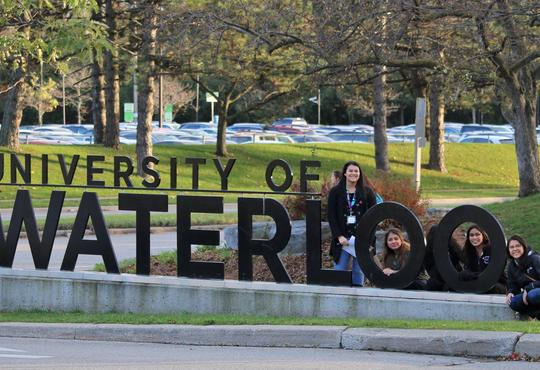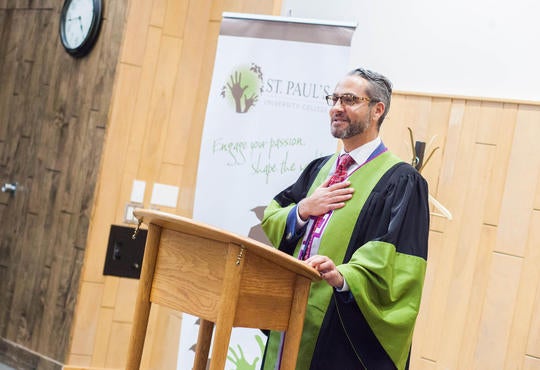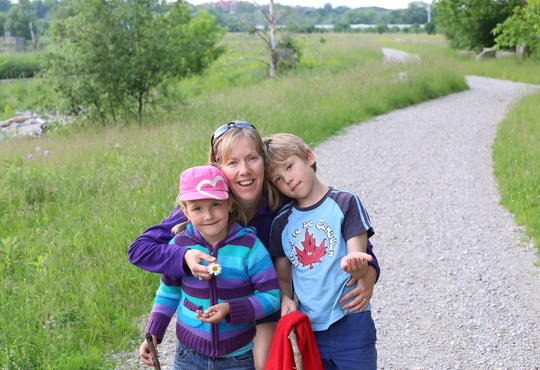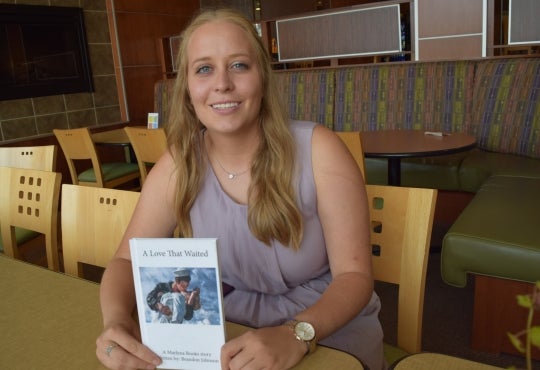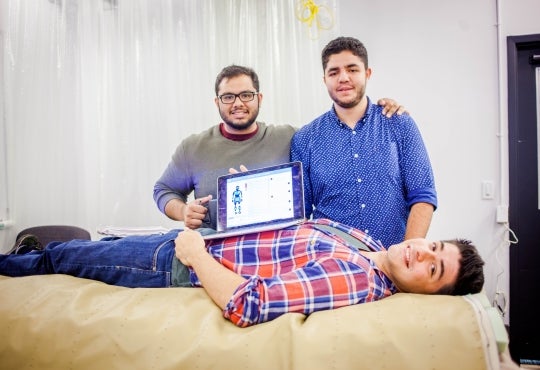A teacher-librarian and a philanthropist. Two very different people, connected by a shared interest in reading and by their support for St. Paul’s students, past and present. Their goal? To create a quiet retreat for students in the middle of the bustling college.
 Karen (Crozier) Koivumaki (BES ’71) is the teacher-librarian. With a lifelong interest in environmental and social issues, she spent her career encouraging her students to look far beyond their small town on the banks of the St. Lawrence. And through activities ranging from essays and research projects to environmental fairs and trips to the Costa Rican rainforest, she brought the world to them.
Karen (Crozier) Koivumaki (BES ’71) is the teacher-librarian. With a lifelong interest in environmental and social issues, she spent her career encouraging her students to look far beyond their small town on the banks of the St. Lawrence. And through activities ranging from essays and research projects to environmental fairs and trips to the Costa Rican rainforest, she brought the world to them.
The philanthropist is Rev. Edward Jackman, a major supporter of library projects at St. Paul’s and the University of Waterloo. In 2012, Father Jackman made a gift to create a comfortable room where students could read high-quality books for pleasure. However, it wasn’t until the recent completion of group study rooms in the new Green Wing that the space could be used for its intended purpose.
With plans underway to redecorate the Edward Jackman Reading Room, Karen was asked to lead the effort to fill the shelves with books. She hopes other St. Paul’s alumni will join her and, through their donations, help build a collection that not only entertains but enlightens.
A world beyond
Originally from Stoney Creek, Karen came to Waterloo because it offered Environmental Studies and because it wasn’t McMaster, the university all her friends planned to attend.
“I wanted to move away from home, but I also wanted to live in a smaller, more intimate community,” she says. “And my faith is very important to me, so St. Paul’s affiliation with the United Church was another thing that drew me. College was a great time for me to explore my self-identity.”
Karen’s studies in Geography and English literature led her to pursue teaching and librarianship as a career. She taught in two small Ontario towns – first in Smiths Falls and then in Iroquois, where she stayed until her retirement in 2004.
Her favourite course was World Issues, in which she introduced her students to global environmental and social issues. “I tried to open my students’ eyes to the world beyond their community,” she says.
Now, Karen hopes to help a new generation of St. Paul’s students expand their horizons through books.
Trudeaus and toboggans
In the years since Karen graduated, many things have changed. But the most important aspects of life at St. Paul’s remain.
In 1971, Pierre Trudeau was Prime Minister. Karen and her classmates used to watch protests against the Viet Nam war on the residence’s communal TV. She remembers meeting other young people from all over Ontario and discussing social issues in seminar groups. Visits to play with young hospital patients were a highlight, along with dances, bridge games and illicit cafeteria-tray tobogganing.
Fast-forward 47 years: Another Trudeau now leads the country and St. Paul’s welcomes students not only from across the province but around the world. Although no longer legally affiliated with the United Church, the college continues to express the values of its founders through a commitment to social justice and respect for different faiths and worldviews.
And the social side of college life is as strong as ever, with students coming together for toast-time, to play pool or to go for hikes along Laurel Creek. Sometimes, when staff aren’t watching, they still careen down snowy hills on cafeteria trays.
And they read.
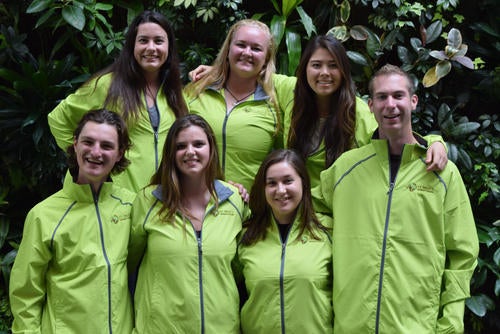
Logan Miller and Morgan Gitt (front left and second from right) were members of the St. Paul’s Don team for multiple terms.
The benefit of a break
Yes, despite the proliferation of laptops, e-readers and smartphones, books still play an important part in the lives of many St. Paul’s students.
Students like Morgan Gitt, who is completing her last year in the International Development program. She reads for enjoyment (thrillers and the short stories of Alice Munro are favourites) and as a break from the pressures of classes and assignments.
“When I read, even if it’s just a few pages or a chapter before bed, I feel like I get time away,” she says.
“I think a lot of my friends like physical books,” adds Logan Miller, a fourth-year Knowledge Integration student, whose eclectic reading list includes Kurt Vonnegut’s Slaughterhouse-Five and The Picture of Dorian Gray by Oscar Wilde. “For instance, it’s so much easier to take a book on the bus than to read something on your laptop.”
Like Karen, Morgan and Logan are involved student leaders who have served as residence dons. And when St. Paul’s Principal, Richard (Rick) Myers, introduced the idea of the Reading Room, both saw the project as a benefit to future students. They now serve on the committee that will decide on the room’s furnishings and, even more importantly, its books.
Connecting over books
Logan and Morgan believe that reading can bring students together, both physically and intellectually.
“When you read, you create images in your head,” Morgan says. “It’s interesting to talk to someone and see what images they’ve created from the same book.”
“I think also that the Reading Room will be a way to connect people over books. Now that the residence has expanded, this is another way to connect students from across St. Paul’s.”
“St. Paul’s is a great place to meet new people and share new ideas. The Reading Room is another part of that,” Logan says. “Reading gets you to empathize with different opinions, different perspectives, which is valuable no matter what program you’re in.”
As far as the types of books that will be included in the Reading Room’s collection, Rick notes that the committee is looking at “books that are elevating and educational, as well as entertaining. But they should also suit university-aged readers.”
We have criteria to help us select books. We want to reflect the college’s academic interests: Canadian studies, Indigenous studies, the environment and international development. We also want a good representation of female and Indigenous authors, with an emphasis on Canadian writers.
Expanding our vision
Why should alumni donate to the Reading Room’s collection?
“It’s a nice way to continue your relationship with your college because these books will connect you directly with current students. Each book will have an inscription with the name of the person who donated it,” Rick says.
It’s also an opportunity to support St. Paul’s academic mission while enhancing the vibrant student experience that Karen and so many other alumni remember.
An experience that – like the books that will, hopefully, soon fill the Reading Room – expands our vision and at the same time, brings us closer together.
Alumni and friends are invited to support this project with a contribution of $40 per book. Please visit http://uwaterloo.ca/stpauls/donate



